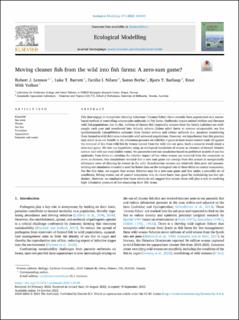| dc.contributor.author | Lennox, Robert | |
| dc.contributor.author | Barrett, Luke T. | |
| dc.contributor.author | Nilsen, Cecilie Iden | |
| dc.contributor.author | Berhe, Saron | |
| dc.contributor.author | Barlaup, Bjørn Torgeir | |
| dc.contributor.author | Vollset, Knut | |
| dc.date.accessioned | 2022-11-28T14:40:55Z | |
| dc.date.available | 2022-11-28T14:40:55Z | |
| dc.date.created | 2022-11-24T10:37:54Z | |
| dc.date.issued | 2022 | |
| dc.identifier.citation | Ecological Modelling. 2022, 474 . | en_US |
| dc.identifier.issn | 0304-3800 | |
| dc.identifier.uri | https://hdl.handle.net/11250/3034571 | |
| dc.description.abstract | Fish that engage in mutualistic cleaning behaviour (‘cleaner fishes’) have recently been popularized as a nature-based method of controlling ectoparasite outbreaks in fish farms. Outbreaks impact animal welfare and threaten wild fish populations; due to this, millions of cleaner fish (especially wrasses from the family Labridae) are wild-caught each year and transferred into Atlantic salmon (Salmo salar) farms to remove ectoparasitic sea lice (predominantly Lepeophtheirus salmonis) from farmed salmon and reduce spillover (i.e. parasites transferring from farmed to wild fish) onto vulnerable wild salmonid populations. However, we hypothesize that this practice may result in no net benefit to the infestation pressure on wild fish if gains in farm-based control trade off against the removal of lice from wild fish by wrasse moved from the wild into net pens. Such a scenario would entail a zero-sum game. We test our hypothesis using an ecological simulation of wrasse as cleaners of farmed Atlantic salmon and wild sea trout (Salmo trutta). We parameterized our simulation based on published models of sea lice epidemics from farms to calculate the relative impact of lice when wrasse are removed from the ecosystem to serve as cleaners. Our simulations revealed that a zero-sum game can emerge from this system at unexpectedly infrequent rates of cleaning by wrasse in the wild. Scandinavian wrasses are relatively data poor and parameterizing our simulation revealed a need for better data on the ecological role of these fishes in coastal ecosystems. For the first time, we suggest that wrasse fisheries may be a zero-sum game and that under a plausible set of conditions, fishing wrasse out of coastal ecosystems may do more harm than good for modulating sea lice epidemics. However, we emphasize that these results do not suggest that wrasse alone will play a role in resolving high infestation pressure of lice emanating from fish farms. | en_US |
| dc.language.iso | eng | en_US |
| dc.rights | Navngivelse 4.0 Internasjonal | * |
| dc.rights.uri | http://creativecommons.org/licenses/by/4.0/deed.no | * |
| dc.title | Moving cleaner fish from the wild into fish farms: A zero-sum game? | en_US |
| dc.title.alternative | Moving cleaner fish from the wild into fish farms: A zero-sum game? | en_US |
| dc.type | Journal article | en_US |
| dc.type | Peer reviewed | en_US |
| dc.rights.holder | © The Author(s) 2022 | en_US |
| dc.description.version | publishedVersion | en_US |
| cristin.ispublished | true | |
| cristin.fulltext | original | |
| cristin.qualitycode | 1 | |
| dc.identifier.doi | 10.1016/j.ecolmodel.2022.110149 | |
| dc.identifier.cristin | 2079823 | |
| dc.source.journal | Ecological Modelling | en_US |
| dc.source.volume | 474 | en_US |
| dc.source.pagenumber | 8 | en_US |

